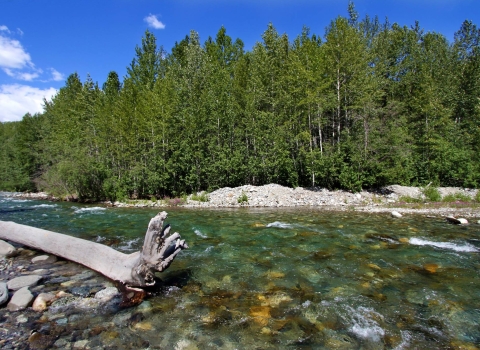The Houston toad, one of the first amphibians to be protected under the Endangered Species Act (Act), and one of Texas’ most critically endangered species, now has a brighter future ahead of it, thanks to a new agreement designed to facilitate conservation by interested landowners. The Safe
Harbor Agreement (Agreement) will provide interested landowners in nine Texas counties the opportunity to contribute to the recovery of the Houston toad without fear of additional restrictions being placed on their activities as a result of their efforts.
The Agreement was submitted by, and will be led by, the Texas Parks and Wildlife Department (TPWD), working with Bastrop County, the Houston Zoo, Texas State University, nonprofit groups and other partners. The Service recently approved the Agreement and a kickoff event was held this
morning in Bastrop County, Texas, at Rancho Zunzun, the first property to enroll in the Safe Harbor Agreement.
“Private landowners are vitally important to conservation efforts for the Houston toad. In developing the Houston Toad Programmatic Safe Harbor Agreement Texas Parks and Wildlife Department and the Service recognized the need for a program that provides private landowners with peace of mind that their efforts to help protect the Houston toad will not result in additional restrictions on their property.” said Amy Lueders, the Service’s Southwest Regional Director. “We believe the Safe Harbor Agreement will greatly enhance our efforts to improve the status of the Houston toad while benefitting other species including songbirds, turkey and white-tailed deer. We greatly appreciate TPWD’s leadership and partnership in this effort.”
“This provides an excellent opportunity for landowners,” said Carter Smith, Texas Parks and Wildlife Department Executive Director. “It’s a win-win opportunity for landowners that allows them to improve habitat for the Houston toad and other wildlife species, without fear of increased liability or additional restrictions, while actively contributing to the recovery of an endangered species.”
The Houston toad is a small, greenish-brown, speckled amphibian that can be distinguished from other toads by its unique high-pitched, trill-sounding call that males emit during breeding choruses each spring. The Houston toad occurs mostly on privately owned property in nine Texas counties including Austin, Bastrop, Burleson, Colorado, Lavaca, Lee, Leon, Milam, and Robertson.
A Safe Harbor Agreement is a voluntary agreement involving private or other non-federal property owners whose actions contribute to the recovery of species listed as threatened or endangered under the Endangered Species Act. In exchange for actions that contribute to the recovery of listed
species, participating property owners receive formal assurances from the Service that if they fulfill the conditions of the agreement, the Service will not require any additional or different management activities by the participants without their consent. In addition, at the end of the agreement period,
participants may return the enrolled property to the baseline conditions that existed at the beginning of the agreement.
The Houston Toad Safe Harbor Agreement is what is known as a programmatic Safe Harbor Agreement. Under the Agreement, Texas Parks and Wildlife Department can enroll individual property owners within the nine county area and convey the permit authorization and assurances to them through a “certificate of inclusion” for up to 30 years. The programmatic Safe Harbor Agreement provides an efficient and streamlined tool for landowners interested in participating in Houston toad conservation actions including brush management, forest restoration, prescribed burning, pond management, invasive species invasive species
An invasive species is any plant or animal that has spread or been introduced into a new area where they are, or could, cause harm to the environment, economy, or human, animal, or plant health. Their unwelcome presence can destroy ecosystems and cost millions of dollars.
Learn more about invasive species control, and reintroduction of Houston toads.
Landowners interested in participating in the Agreement should contact Meredith Longoria by calling 512-389-4410, or emailing meredith.longoria@tpwd.texas.gov. Additional information on the Houston toad and the Agreement are available here.
America’s fish, wildlife, and plant resources belong to all of us, and ensuring the health of imperiled species is a shared responsibility. We’re working to actively engage conservation partners and the public in the search for improved and innovative ways to conserve and recover imperiled species.
The U.S. Fish and Wildlife Service works with others to conserve, protect, and enhance fish, wildlife, plants, and their habitats for the continuing benefit of the American people. For more information on our work and the people who make it happen, visit http://www.fws.gov/. Video, photos and others Houston toad information is available at https://tpwd.texas.gov/newsmedia/releases/news_roundup/.


